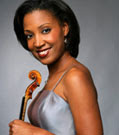'Fiddler' without voices: Kelly Hall-Tompkins takes a holiday
Part of the aura of "Fiddler on the Roof" into which Kelly Hall-Tompkins stepped about five years
 |
| Kelly Hall-Tompkins |
ago is its status as an enduring monument of the American musical stage.
In the title role, the violinist's association with a revived Broadway production of the 1964 hit musical has resulted in a clutch of arrangements (hers and chiefly Oran Eldor's) showcasing her virtuoso skills, usually with the accompaniment of accordion, double bass and guitar.
The instrumentation keeps the folk flavor of the Jerry Bock-Sheldon Harnick music intact. It also reflects the sensitivity, wit, and pathos of Joseph Stein's book and its rootedness in stories by Sholem Aleichem about village life of Jews living under tsarist rule just after the turn of the 20th century.
In a touring presentation Thursday night at Madam Walker Theater Center, Hall-Tompkins sailed through a selection of the musical adaptations she commissioned and, in the case of "If I Were a Rich Man," created herself. The International Violin Competition of Indianapolis presented "Fiddler's Holiday: Expanding Tradition" in its Laureate Series.
After a kind of overture in the form of Eldor's "Rhapsody and Scherzo," with quotes from "Sunrise, Sunset" and "To Life" lending most of the musical substance, the ensemble launched into "Matchmaker, Matchmaker." Hall-Tompkins' fleet adeptness and savvy ornamentation were convincingly exhibited in that overture. In the song of the milkman Tevye's daughters hoping for the best results from their required arranged marriages, the violinist's grasp of emotional nuance moved front and center. The characters' various forms of wishful thinking came through in her performance.
Many members of the Metropolitan Youth Orchestra attended, and family groups were common among the enthusiastic attendees. That fact would have made welcome a little more context in Hall-Tompkins' remarks from the stage. As well-known as "Fiddler on the Roof" is, some brief orientation to what the songs express could only have enhanced the audience's enjoyment.
It would have been especially useful in Hall-Tompkins' spoken introduction to the duet of Tevye and his wife, Golde. She advised the audience to listen to how she would play Golde's startled "Do I WHAT?" response to her husband's question: "Do you love me?" Hall-Tompkins' rendition of that line was superb, but I wonder if those unfamiliar with the story line realized that Golde is not expressing skepticism that Tevye is lovable. She's amazed at the question because theirs was an arranged marriage, according to tradition, and love's relevance to the lifelong bond in shtetl culture was an innovation in that milieu.
For that reason, the song "Tradition," which sets the social parameters of the whole show, could have been given more attention in "Fiddler's Holiday." No one expects an instrumental presentation of songs to fill in all the blanks (of either lyrics or plot), but this concert might have taken Hall-Tompkins' obvious love of "Fiddler on the Roof" to a more evident level. And it could have all been handled by a few more oral program notes.
Near the end were a couple of nods to the holiday season, sprightly versions of "Here Comes Santa Claus" and "Jingle Bells." A lively side trip to another show drawing from the same cultural well was the nostalgic "My Mother's Menorah" from "The Odd Potato," by Gail C. Bluestone.
This was among the tender aspects of solo violin playing in which the legacy is rich. Also moving as an indication of the soloist's investment in her material was how she played "Anatevka," "Fiddler on the Roof"'s farewell to the community from the inhabitants forced into exile. Throughout this song and others, the alertness and feeling for color displayed by guitarist Stephen Benson, accordionist Joshua Camp, and bassist John-Paul Norpoth put Hall-Tompkins in the best light, in which she shone.



Comments
Post a Comment